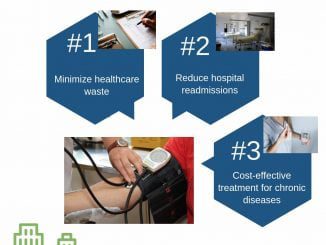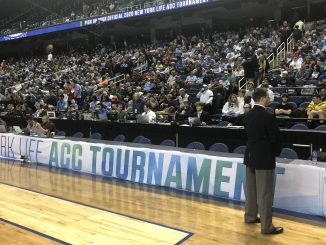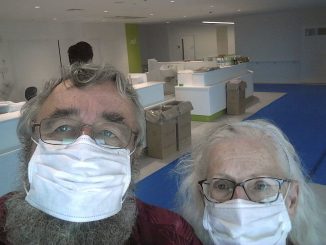RALEIGH — In November, North State Journal interviewed Dr. John Sanders, the primary investigator involved in the Wake Forest Baptist Health COVID-19 antibody study that launched in spring of 2020.
In a previous report on the conversation with Sanders, the topline findings included the fact that 30% in North Carolina had antibodies pre-vaccines, which rose to 95% post vaccine rollout. Additionally, the antibody study portion showed 91% “real world effectiveness” in preventing disease following vaccination.
On the topic of herd immunity, Sanders said that is “obviously a very complex question” and that “it’s a much more complex question than we had hoped it would be 18 months ago.”
“You know, my hope for society was that a simple antibody test like this would predict protective immunity, and it does not,” Sanders said. “So, we have not been able to show that it does based on the tests that we’ve been using, and really nobody’s been able to show this sort of simple antibody test as a predictive, correlative protection.”
He then said that people can have been vaccinated or had an infection can have a negative or positive antibody test and still be protected.
“We should not look to these simple antibody test as a correlate of protection… as a biological indicator that they are protected,” Sanders said. “And you know, going along with that, that means that we can’t use the test to say, ‘Oh, I took the vaccine, I checked my antibody, it was positive. Now my antibody is drifted low enough that it’s negative, I have to have a booster.’”
“We have not been able to show that clear correlation,” Sanders added.
“Now going into herd immunity, we had hoped that we would get to something like, you know, 70, 80% combination of natural infection and vaccinations and that would decrease the efficiency of spread so much that we would have population protection,” said Sanders.
“A couple of things, some of which we’ve shown but we have to take it with a big grain of salt, are really simple antibody tests,” Sanders said. “We were able to show that people who have been naturally infected, that 50% of them went from a positive test to a negative test within about just a little over two months.”
Sanders said that, with the simple antibody test, within a few months after a natural infection they could see antibody decay and that the individual’s levels “dropped low enough that the test became negative.”
“With the better test that we tend to LabCorp, we still see that decay, but the test can stay positive a lot longer,” said Sanders. “That instead of within a couple of months, it’s more like six and 12 months we start to see that that decay.”
“We had hoped we would get to about 70 to 80% and that we would have heard immunity,” Sanders said. “And frankly, looking at our data, we had about 30% of North Carolinians infected at the end of December and then lots of people went out and got vaccinated and, so, probably by February to March — certainly in our data — we showed a steep increase in the presence of antibodies in our cohort following vaccination because lots of our people got vaccinated.”
Sanders added that his guess is that between natural immunity and vaccination, “we were at that 70 to 80% by late spring, maybe mid spring.”
When there was a more contagious variant introduced, Sanders said our protection was “not quite as good.”
When it comes to natural immunity, Sanders said there have been mischaracterizations reported by media.
“I should say for the record, because I hear people pop on the news all the time, not usually vaccinologists, not usually immunologists, not usually positions of any breed,” said Sanders. “[They] pop on the news all the time and say, ‘It’s been shown over and over again natural immunity is better.’ That is a mischaracterization of the data. That is a gross mischaracterization of the data. That is not the case.”
“There are advantages to natural immunity, but it is not clearly better and it is not clearly more protective than vaccine immunity,” Sanders said. “But, with either vaccine immunity or natural immunity, you’re going to have breakthrough cases and in the best situation, which right now, the best situation looks to be people who have had a mild-moderate infection followed by vaccination.”
Sanders said severity of infection and age both seem to play a part in longer lasting antibodies. Those with moderate-to-severe symptoms have antibodies that “lasted longer,” and “the older you get the quicker it goes down.”
“People who are relying on natural immunity, that is going to wane,” said Sanders. “People are relying on vaccines; it is going to wane.”
“But what we are seeing out of both, and especially a combination of both, is that when people are getting reinfected and reinfected, they are less likely to spread and they have fewer symptoms,” Sanders said.
“The more people we get vaccinated, the more we will move into that herd immunity, which does not mean, we will go to zero,” said Sanders. “It means that we will evolve with the virus to the point that just like the other human coronaviruses, just like all the cold and flu viruses circulating out there, almost all of us will get infected at some time or times in our lives and it will move towards most of the time.”
“There is a misconception that keeps getting reported out trying to treat vaccines as if you put them on and you’re completely invulnerable, you’re completely encased,” said Sanders. “And really, it’s like having a raincoat and an umbrella. You’re still going to get wet, but if it’s a mild rainstorm and you’ve got an umbrella and a raincoat, you might come out hardly wet at all.”
He added that “If you’re in a downpour, even with a raincoat and umbrella, you’re going to get wet. You’re not going to be as wet as the person without the raincoat and umbrella, but you’re going to get wet.”
Read part one of the interview with Dr. Sanders.



